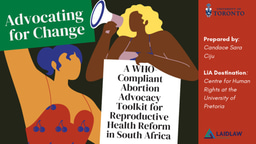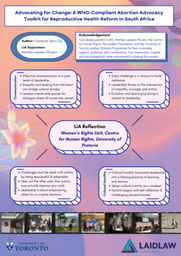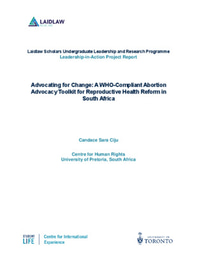LiA Week 3 Log - Building Friendships
What went well?
This week, I made significant progress on developing the Abortion Advocacy Toolkit. I had the opportunity to share my work and ideas with the Women’s Rights Unit and my supervisor, who recently returned from her state reporting trip to The Gambia. Beyond internal team discussions, I actively engaged with various staff members across the Centre for Human Rights to gather diverse perspectives on the direction, purpose, and implementation of the toolkit. This cross-departmental engagement helped ensure that the toolkit is shaped by a wide range of expertise and lived experiences. Their insights were instrumental in helping me draft the initial framework, which I’ve now shared with my team for feedback.
Recognizing that the toolkit will be launched at the Centre’s Women’s Day Commemoration Event in August, I also began building connections with key stakeholders. I compiled a list of hospitals, clinics, medical practitioner associations, NGOs, civil society organizations, women’s rights groups, and policymakers who could be invited to the event. This outreach aims to ensure that the toolkit reaches those who can deploy the toolkit most effectively to use in real-world contexts.
Outside of work, I continued to connect with the local community and culture. I explored several markets in Pretoria and traveled to Johannesburg and Soweto. A highlight was visiting the Cradle of Humankind, a UNESCO World Heritage Site, where I had the unforgettable experience of exploring the Sterkfontein Caves. My group even got to venture into a “secret” passage and also saw the site where the famous skull of Mrs. Ples was found. These experiences enriched my knowledge of South Africa’s pre-historic, cultural, and natural heritage. I’ve also been fortunate to build friendships with students at the University of Pretoria, who welcomed me into their community, showed me around campus, and took me to local museums.
What could have been done differently?
I completed the skeleton of the Abortion Advocacy Toolkit by the third week of my LiA. However, it was somewhat challenging to get specific guidance and clarity on the project early on, as much of the team was away on a state reporting trip during the first two weeks of May. The Centre is a very dynamic environment, with frequent courses, seminars, and reporting trips happening throughout the month. While this creates an exciting and fast-paced workplace, it also made it difficult to anticipate when team members would be available physically. It would have been helpful to receive a schedule of the Centre’s major events and activities at the beginning of the LiA. That would have allowed me to better plan my individual deadlines around periods when the team were more likely to be available for input. If the direction and intended outcomes of the toolkit had been clearly outlined in the first week, I believe the skeleton could have been completed by the mid-Week 2. That said, I’ve learned the value of working in such a dynamic space, and I now recognize that requesting a team calendar or event schedule early on would have been helpful. Fortunately, this slight delay hasn’t impacted the overall pace of the project, I’m expecting feedback by mid-Week 4 and aim to have the full toolkit ready by Week 5.
What did I learn about myself when working with others?
Working with a diverse group of professionals at the Centre for Human Rights taught me that I thrive in collaborative environments where ideas are openly exchanged. It reaffirmed that I’m someone who values multiple perspectives and actively seeks out feedback, not just to improve my work but to ensure it reflects the experiences and insights of others. I also discovered that I’m comfortable navigating ambiguity, especially in fast-paced settings, and that I can take initiative to move a project forward even when clear direction is not immediately available. This experience has strengthened both my confidence and adaptability when working with others in a multidisciplinary team.
What did I learn about leadership?
Soweto is a township of the City of Johannesburg, bordering the city’s mining belt. The creation of Soweto was due to apartheid-era policies, particularly the Group Areas Act (Land Act) and subsequent forced removals of Black people from the city of Johannesburg, which was converted into a "whites-only" area. The Act prohibited Black people from owning land in designated white areas and led to the forced and immediate relocation of Black residents from existing townships to newly established areas like Soweto. From the 1950s, Soweto became an epicentre of political campaigns aimed at overthrowing the apartheid state, and in 1955 it was the location where 3,000 people came together to adopt the Freedom Charter, which later became the foundation of the South African Constitution. Leaders I draw inspiration from, such as Nelson Mandela, Desmond Tutu, and Tsietsi Mashinini, are all from Soweto. Wealth disparity seeps into every corner of Soweto, with a street running between the propaganda houses built by the apartheid government for rich, business-owning Black residents on the left, and the areas on the right where non-elite Black people were forcibly relocated after the Land Act. To this day, serious poverty exists in these neighbourhoods, and the government does not do much to support the residents.
I was fortunate to visit one of these neighbourhoods and talk to a community leader who took me around. She spoke about the different families living there, including migrant families from other African countries like Tanzania. Three to four families shared a bathroom, and municipal services only come once a week to clean them. She told us how she knew everyone in her community and how they were like family to her. Her children were being taken care of by other families while she was speaking to us. She spoke about how, if a neighbour had nothing to eat one night, they were always welcome to knock on someone’s door for food. Walking through the neighbourhood, people waved at me and children were all smiles. I was so inspired by their model of community leadership and how they make do with what they have. The neighbourhood does not have electricity or WiFi, but that does not stop them from connecting wires from the “propaganda houses” on the left side of the street. The government comes to disconnect them, but the residents simply reconnect the wires once the officials leave. The community leader shared how politicians would come around during elections and promise new housing if they were elected, but those promises were never kept. So, the community relies on each other and continues forward with resilience and determination.
I left that community feeling inspired and certain that I chose the right field to work in. Leadership is never about having a title or being in power. That cannot be a mark of a good leader. Being a good leader is being accountable to your community, to advocate, lobby and do what is necessary to make sure no one is left behind. I aspire to be part of grassroot and community-based leadership and policymaking that listens to and supports such communities, where leadership already exists (such as the brilliant community leader I talked to), and just needs to be recognized, resourced, and respected.
What do I want to develop or focus on next?
Next week will be a busy one at the Centre, as the Women’s Rights Unit is hosting an advanced short course on Women’s Rights in Africa. A great deal of planning and preparation has gone into organizing this week-long course, which brings together individuals from across the continent. Around 30 participants will be attending in person, and another 60 will be joining via Zoom.
Each day, the course will feature three guest speakers, including CSO members, professors, UN Special Rapporteurs, and activists who are all working to advance women’s rights in Africa. I am assisting with the execution of the short course and am also fortunate to be attending the sessions myself.
In the coming week, I want to focus on building connections with participants and speakers, learning from their experiences from all over Africa, and engaging more deeply in conversations around women’s rights advocacy across different regional and cultural contexts. I hope to use this opportunity to not only support the Centre’s work more actively, but also to grow my own understanding of cross-continental feminist activism and collaborative leadership.



Please sign in
If you are a registered user on Laidlaw Scholars Network, please sign in
Love this, Candace ! :)
Thank you Vaibhav!